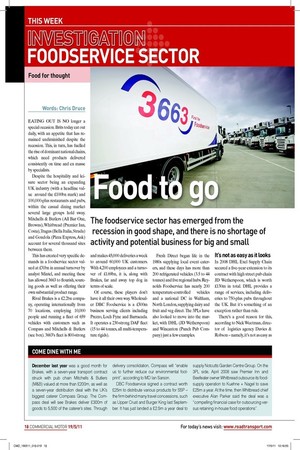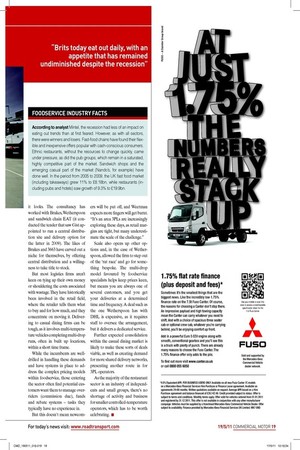FOODSERVICE SECTOR
Page 12

Page 13

If you've noticed an error in this article please click here to report it so we can fix it.
Food for thought
Words: Chris Druce
EATING OUT IS NO longer a special occasion. Brits today eat out daily, with an appetite that has remained undiminished despite the recession. This, in turn, has fuelled the rise of dominant national chains, which need products delivered consistently on time and en masse by specialists.
Despite the hospitality and leisure sector being an expanding UK industry (with a headline value around the £100bn mark) and 100,000-plus restaurants and pubs, within the casual dining market several large groups hold sway. Mitchells & Butlers (All Bar One, Browns), Whitbread (Premier Inn, Costa), Tragus (Bella Italia, Strada) and Gondola (Pizza Express, Ask) account for several thousand sites between them.
This has created very specific demands in a foodservice sector valued at £31bn in annual turnover by analyst Mintel, and meeting these has allowed 3663 to flourish, sourcing goods as well as offering their own substantial product range.
Rival Brakes is a £2.2bn company, operating internationally from 70 locations, employing 10,000 people and running a fleet of 659 vehicles with customers such as Compass and Mitchells & Butlers (see box). 3663’s fleet is 800-strong and makes 45,000 deliveries a week to around 60,000 UK customers. With 4,200 employees and a turnover of £1.69bn, it is, along with Brakes, far and away top dog in terms of scale.
Of course, these players don’t have it all their own way. Wholesaler DBC Foodservice is a £300m business serving clients including Prezzo, Loch Fyne and Barracuda. It operates a 230-strong DAF fleet (15 to 44 tonnes, all multi-temperature rigids). Fresh Direct began life in the 1980s supplying local event caterers, and these days has more than 200 refrigerated vehicles (3.5 to 44 tonnes) and five regional hubs. Reynolds Foodservice has nearly 200 temperature-controlled vehicles and a national DC in Waltham, North London, supplying dairy and fruit and veg direct. The 3PLs have also looked to move into the market, with DHL (JD Wetherspoon) and Wincanton (Punch Pub Company) just a few examples.
It’s not as easy as it looks
In 2008 DHL Exel Supply Chain secured a five-year extension to its contract with high street pub chain JD Wetherspoon, which is worth £130m in total. DHL provides a range of services, including deliveries to 750-plus pubs throughout the UK. But it's something of an exception rather than rule.
There’s a good reason for this, according to Nick Weetman, director of logistics agency Davies & Robson – namely, it’s not as easy as it looks. The consultancy has worked with Brakes, Wetherspoon and sandwich chain EAT (it conducted the tender that saw Gist appointed to run a central distribution site and delivery option for the latter in 2009). The likes of Brakes and 3663 have carved out a niche for themselves, by offering central distribution and a willingness to take title to stock.
But most logistics firms aren’t keen on tying up their own money or shouldering the costs associated with wastage. They have historically been involved in the retail field, where the retailer tells them what to buy and for how much, and they concentrate on moving it. Delivering to casual dining firms can be tough, as it involves multi-temperature vehicles completing multi-drop runs, often in built up locations, within a short time frame.
While the incumbents are welldrilled in handling these demands and have systems in place to address the complex pricing models within foodservice, those entering the sector often find potential customers want them to manage overriders (commission due), funds and rebate systems – tasks they typically have no experience in.
But this doesn't mean newcom ers will be put off, and Weetman expects more fingers will get burnt. “It’s an area 3PLs are increasingly exploring these days, as retail margins are tight, but many underestimate the scale of the challenge.” Scale also opens up other options and, in the case of Wetherspoon, allowed the firm to step out of the ‘rat race’ and go for something bespoke. The multi-drop model favoured by foodservice specialists helps keep prices keen, but means you are always one of several customers, and you get your deliveries at a determined time and frequency. A deal such as the one Wetherspoon has with DHL is expensive, as it requires staff to oversee the arrangement, but it delivers a dedicated service.
Further expected consolidation within the casual dining market is likely to make these sorts of deals viable, as well as creating demand for more shared delivery networks, presenting another route in for 3PL operators.
As the majority of the restaurant sector is an industry of independents and small groups, there’s no shortage of activity and business for smaller controlled-temperature operators, which has to be worth celebrating. ■









































